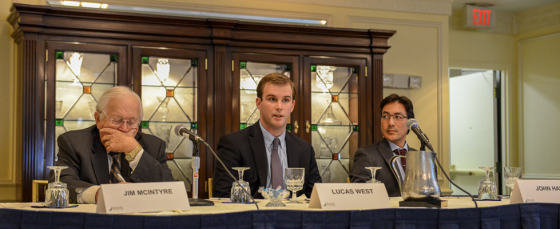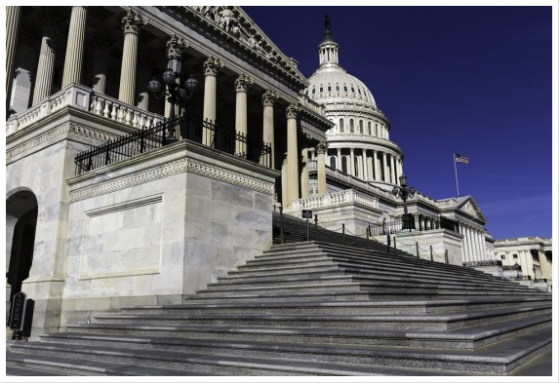Today, RIMS is taking its annual Legislative Summit online, kicking off the first RIMS Virtual Advocacy Week. Featuring a full slate of networking, a panel on pandemic insurance, updates on the 2020 U.S. elections, and hands-on advocacy with members of Congress, RIMS Virtual Advocacy Week is still open for last-minute registrations, if you want to join in on the action.
On Wednesday, September 16, the agenda includes a fireside chat with Florida Insurance Commissioner David Altmaier, who is also president-elect of the National Association of Insurance Commissioners (NAIC). Commissioner Altmaier has held the position for four years and has been with the Florida Office of Insurance Regulation office for nearly 12.
Altmaier recently appeared on RIMScast to discuss the issues he will address in Wednesday’s session, most notably the impact COVID-19 has had on the landscape of business interruption coverage. Check out the highlights below, and download the episode for Commissioner Altmaier’s full interview and a deeper dive into other topics such as ORSA reports, the Terrorism Risk Insurance Act (TRIA) and the National Flood Insurance Program (NFIP).
What playbook did you use to prepare and react to COVID-19?
David Altmaier: Our response initially looked a lot like what we would do for an inbound hurricane: We assembled what we call our “incident management team,” and started to look at the types of needs of consumers from an insurance standpoint. We put into place mechanisms that we thought would be helpful as the pandemic began to take hold in Florida and around the United States. And we saw insurance commissioners around the country doing the same thing, obviously, as the pandemic unfolded and we started to see other risks and concerns emerge.
COVID-19 has been at the forefront of all of our regulatory discussions going back to March of this year. and that will continue to be at the forefront of our discussions even after the pandemic has concluded.
Business interruption insurance is closely tied to it and has emerged as one of the more pressing insurance issues as a result of the pandemic. We have seen issues like telemedicine and catastrophe response in a virtual setting, for example, also come up as a result. [That has] impacted how we go to work every day and how we interact with our stakeholders, and I think those will be some worthy discussion topics as well.
How can the risk management community drive meaningful change in regulations, policies and legislation?
DA: As discussions take place about an event that we haven’t seen in a really long time, like a pandemic, there will be a lot of ideas that come up in terms of how to react to the current pandemic, as well as how to prepare for future pandemics. And I think that, as we have those conversations, there’s going to be a multitude of stakeholders whose viewpoints are important.
Risk managers are certainly going to be at the top of that list because they are going to understand the risks that the insurance industry faces. We see ideas of what level of responsibility the insurance industry [should have] in terms of covering things like business interruption insurance. Their expertise will be invaluable as we begin to work with state and federal leaders in crafting policies that can assist with the current pandemic, as well as future pandemics.
Own Risk and Solvency Assessment, or ORSA, is a framework heralded by the NAIC. Why should risk and insurance professionals look to ORSA reports for guidance?
DA: ORSA reflects how our insurance market, along with other majors of our economy, evolves over time and responds to new and emerging risks. It’s a constantly changing environment that regulators are trying to evolve along with, and our teams here in the insurance departments are trying to make sure that we stay ahead of the curve in terms of identifying those emerging risks.
The ORSA report is a glimpse into the thought process for our larger companies and groups into the boardroom and into the C-suites. [It features] theories on their own risk and how their unique position in the marketplace might expose them […] and require them to take steps to mitigate those risks. It’s a really critical piece of information for regulators to have as we build our own supervisory plans, going forward. Obviously, the pandemic that has occurred—like with any catastrophe—potentially highlights things that may have previously not been considered.
Let’s talk about force majeure. The pandemic has inspired new legislation to be drafted that affects the language of insurance policies in an effort to cover interruption. Where does the NAIC stand on that?
DA: NAIC sent feedback to Congress early on, in early to mid-March, with our thoughts that requiring carriers to cover losses that weren’t previously contemplated under the policy forms could do a lot more long-term harm than short-term good.
We have seen some state houses file state legislation that would be similar, in that it would require carriers to cover business interruption losses even if the policy forms didn’t contemplate that. We’ve sort of left it to individual insurance commissioners in those states to work with their legislatures on what’s best for their market.



 WASHINGTON—The RIMS Legislative Summit kicked off on Wednesday in Washington, D.C. with a panel lead by Congressional office staff.
WASHINGTON—The RIMS Legislative Summit kicked off on Wednesday in Washington, D.C. with a panel lead by Congressional office staff.